Salvador, Brazil
Located in the state of Bahia, a lovely tropical state with sun-kissed beaches, coconut groves, golden sunshine, refreshing blue sea and great weather year round, Salvador was a major place for the slave trade and is now a thriving center of Afro-Brazilian life. Once the first capital of Brazil, it is considered the country’s soul and the birthplace of Brazilian culture. The local cuisine, music, dance and vibrant visual arts are all testaments to the pervasive African influence. As one of Brazil’s great historical destinations, the city is filled with churches, homes and forts that reflect stunning Portuguese architecture from the Baroque period. The warmth of the “Baianos” and their openness is evident. People of mixed blood – mulattos – the result of an incredible mixture of races: black, white and Indian. It is characterized by its profound and multiple religious beliefs, a fantastic mixing of religions, which constitutes a great part of Bahian soul.
Experience | Carnival in Salvador Bahia
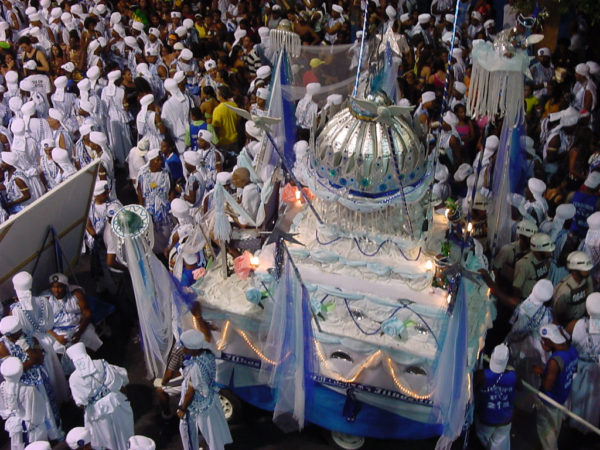
The Bahian Carnival is an annual celebration that takes place in the capital of Salvador. The presence of Afro Brazilian folklore, music, and dance are fervent cultural expressions brought on by the Trios Electricos. These motorized floats are the life of the street party, carrying a range of acts including musicians and singers. Although Carnival in Brazil is well-known for its celebration in Rio de Janeiro, it is much more diverse in Salvador. Offering both samba and axe music, a fusion of African and Brazilian pop that became popular in the mid-1980s. There are many ways to enjoy the Carnival in Salvador such as joining a bloco that consists of two trucks, one with the band, and the other is equipped with a bar and washrooms. If you’re looking to soak in the fun far away from the party, then we recommend enjoying the views from the camarotes.
Experience | Walk through Historical Salvador
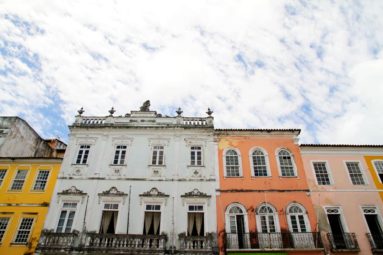
The best way to visit the Historical Centre of Salvador, considered National Heritage and declared World Heritage by UNESCO, is on foot, taking your time unraveling the mysteries of this city rich in contrasts, history, and beauty. We will visit the Municipal Square, from can be seen one of the most beautiful views of the city; Terreiro de Jesus square, the magnificent Basilica Cathedral and the former School of Medicine are located; the famous church of San Francisco, with its baroque style and fully gold leafed interior; ending at Pelourinho, surrounded by the Casa de Jorge Amado Foundation and the Rosário dos Pretos Church – one of the greatest expressions of Bahian syncretism. Walking through the Historical Centre is a journey through time and feelings. The music, colors, smells of Bahian street food are always present, providing for an unforgettable experience.
Experience | Bahian Cuisine Cooking Class
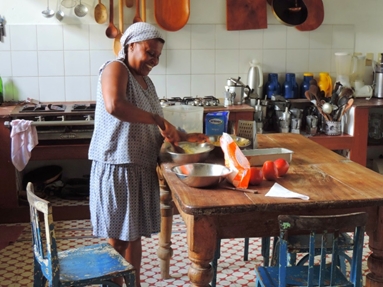 The wide range of Bahian cuisine is a real festival for the senses: sight, taste, and odor. The experience begins with a visit to a popular market, to learn about the ingredients that will be used to prepare the lunch meal, which is the subject of this cooking class. The cooking class will take place in the restaurant or in the house of the cook, which will give you all the tips on how to prepare a good Bahian food! At the end of the class, lunch will be served. It is time to enjoy the meal!
The wide range of Bahian cuisine is a real festival for the senses: sight, taste, and odor. The experience begins with a visit to a popular market, to learn about the ingredients that will be used to prepare the lunch meal, which is the subject of this cooking class. The cooking class will take place in the restaurant or in the house of the cook, which will give you all the tips on how to prepare a good Bahian food! At the end of the class, lunch will be served. It is time to enjoy the meal!
Experience | Afro-Brazilian Heritage Tour
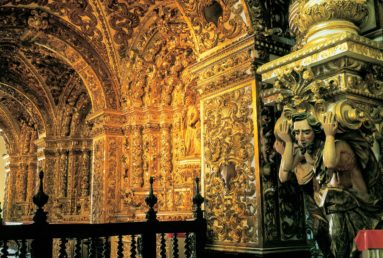
This tour is a journey through the history of the city of Salvador, and the history of Brazil as well, with a focus on African heritage, passing through the most important monuments to the Historic Center, a major urban complex of the colonial period.We start at Farol da Barra, at the entrance of the All Saints Bay, where today the City Nautical Museum functions. Close by is Porto da Barra, with its two protecting forts of Santa Maria and San Diego Forts and then the traditional neighborhoods of Corredor da Vitória, Campo Grande (this square is the heart carnival of Bahia), and Piedade. Arriving at the Praça Municipal we have a beautiful view of the Lacerda Elevator, as well as the Lower City and the All Saints Bay. Following on foot to Pelourinho, the highlight of our trip, considered by UNESCO the largest collection of colonial architecture from the 17th and 18th in Latin America. The colorful houses and the charming streets and sidewalks of stone make this tour even more interesting. Churches such as San Francisco, known as “gold church” with baroque interior covered with gold leaf, and the Afro-Brazilian Museum, are an indispensable part of this visit. Walking through this colonial architectural treasure, that is also one of the most important places of African heritage in Brazil, we will find at Pelourinho, as well as a wide variety of museums, as well as the Casa do Benin and the Rosário dos Pretos Church – one of the greatest expressions of Bahian syncretism – among other highlights. Walk through the Historical Centre is a journey through time and feelings. The music, colors, smells of Bahian street food are always present, provide for an unforgettable experience.
Experience | Capoeira Classes
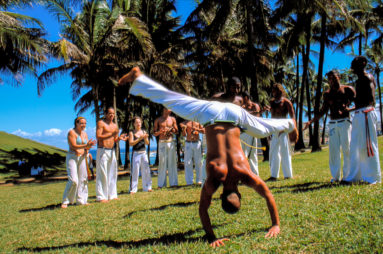
Upon arrival in Brazil, the Africans felt the need to develop ways to protect themselves against the violence and repression of Brazilian settlers. They were constant targets of bloody practices and punishments by the plantation owners. When fleeing from the farms, they were persecuted by the authorities, who had extremely barbarous capture techniques. The farmers did not allow slaves to practice any kind of fight. Therefore, slaves used the rhythm and movements of African dances to create a martial art disguised as a dance, which was an important instrument of cultural and physical resistance. Music also plays a very important role in Capoeira and it should not be performed without the full accompaniment of four berimbaus, (a bowed one-stringed instrument and the Capoeira backbone), one conga, tambourines and an assortment of other percussion instruments. Like all great martial arts, there is a very vital philosophy and a way of life associated with being a capoeirista (a capoeira fighter). To become a master demands years of dedication to the finer details of this art. During the visit to Master Bimba School, we will have the chance to learn about the philosophy and the basic fight movements.
Thinking of exploring the cultural richness of Salvador? Contact our Alluring Americas Destination Specialists at 800-701-4278 or email us!
